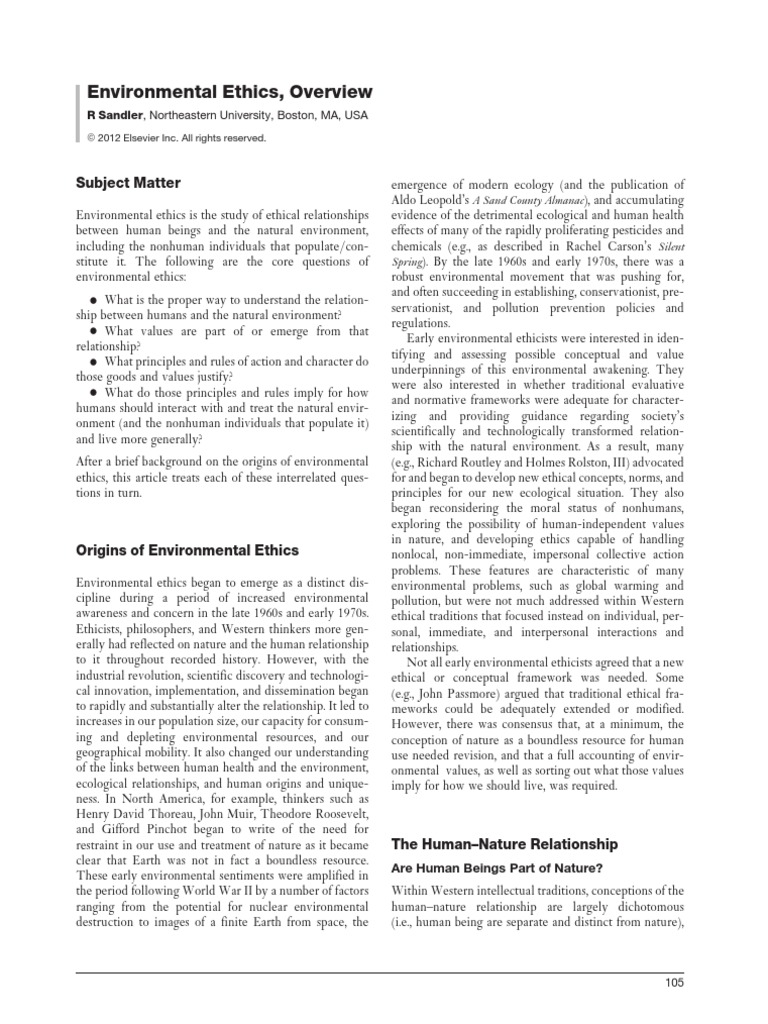Environmental ethics is an intriguing discipline that interrogates the moral relationship between humanity and the natural world. This field has burgeoned over recent decades, driven by escalating environmental crises including climate change, biodiversity loss, and pollution. A significant re-evaluation of our ethical frameworks is essential for fostering a sustainable future. Here, we explore several pivotal views that constitute the spectrum of environmental ethics, each offering unique insights and prompting a paradigm shift in how we engage with the environment.
1. Anthropocentrism
In the realm of environmental ethics, anthropocentrism is a prevailing perspective that posits humanity as the central focus of moral consideration. This view asserts that human beings hold intrinsic moral value, often relegating nature to a mere resource to be utilized for human benefit. Proponents argue that environmental policies should emphasize human welfare, advocating for conservation and sustainability efforts that primarily serve societal interests. However, this perspective often draws criticism for fostering exploitative practices that disregard the inherent value of non-human life.
2. Biocentrism
Unlike anthropocentrism, biocentrism advocates for inherent moral value in all living beings. This perspective extends moral consideration beyond the human realm, positing that animals, plants, and even microorganisms possess intrinsic worth, thereby deserving ethical consideration. Biocentrists argue for the protection of biodiversity and ecosystems, emphasizing the interconnectedness of life forms. This holistic approach compels society to recognize the ramifications of human actions on all life, advocating for a paradigm that prioritizes the health of the biosphere over mere human convenience. Biocentrism essentially reframes the discussion, urging a collective responsibility towards all forms of life.
3. Ecocentrism
Ecocentrism further refines the discourse by positioning ecological systems at the forefront of moral consideration. This view transcends both anthropocentrism and biocentrism, asserting that ecosystems, habitats, and the intricate interdependencies within them warrant ethical regard. By acknowledging the intrinsic value of natural systems, ecocentrism calls for a comprehensive understanding of ecological processes, urging policies that consider the sustainability of entire ecosystems rather than targeting individual species. This perspective recognizes that human well-being is inextricably linked to the health of the environment, thereby advocating for a symbiotic relationship between humanity and nature.
4. Deep Ecology
A movement within the ecocentric framework, deep ecology posits that the physical environment is not merely a backdrop for human activity but a complex, interdependent web of life deserving of moral consideration. Arne Naess, the founder of deep ecology, emphasized that well-being and flourishing of human and non-human life are both interconnected. This philosophy encourages profound ecological awareness and promotes radical changes in societal values and structures. Advocates of deep ecology call for a profound shift, urging humanity to diminish its population and consumption levels to enable the environment to regenerate and thrive.
5. Ecofeminism
Ecofeminism scrutinizes the intersectionality of gender and environmental issues, positing that the domination of women and the exploitation of nature are rooted in similar historical and cultural ideologies. This perspective argues that patriarchal structures contribute significantly to environmental degradation, drawing parallels between the oppression of women and the exploitation of natural resources. Ecofeminists advocate for a more inclusive approach to environmental ethics, emphasizing the need for empowerment and equity as essential components of ecological sustainability. Through this lens, the holistic welfare of communities—especially marginalized groups—becomes integral to addressing environmental challenges.
6. Land Ethics
Developed significantly by Aldo Leopold, land ethics extends the moral community to include the land itself. This view emphasizes that humans have ethical obligations not only to each other and non-human entities but also to the ecosystems and lands upon which they reside. Land ethics fosters a profound respect for the interconnectedness of life, promoting stewardship and conservation practices that honor the integrity of natural landscapes. This perspective engenders a sense of place and community, encouraging individuals to cultivate a deep-rooted commitment to the environmental legacy they will leave for future generations.
7. Environmental Pragmatism
Environmental pragmatism offers a unique approach by focusing on practical solutions to environmental issues rather than rigid philosophical doctrines. This perspective advocates for cooperation among diverse stakeholders—scientists, policymakers, activists, and the business community—to develop actionable strategies for addressing environmental degradation. Environmental pragmatists argue that ethical considerations should lead to tangible results and practical outcomes while remaining adaptable to evolving circumstances. This focus on pragmatism encourages innovation and encourages diverse approaches to environmental challenges, from technological advancements to grassroots movements.
Conclusion
The exploration of various views within environmental ethics reveals a complex tapestry of moral considerations regarding our relationship with the natural world. Each perspective, whether anthropocentric, biocentric, ecocentric, or centering around social dimensions like ecofeminism, invites reflection and critical discourse on the ethical implications of our actions. As environmental dilemmas become increasingly pressing, these ethical frameworks promise a profound shift in perspective. They compel society to cultivate a deeper understanding and foster a healthier relationship with the environment—an endeavor that not only enriches our moral compass but also secures a sustainable future for both humankind and the intricate web of life that coexists with us. Adopting these diverse ethical principles may pave the way toward holistic solutions, urging humanity to reconnect with the natural world in transformative and enduring ways.










